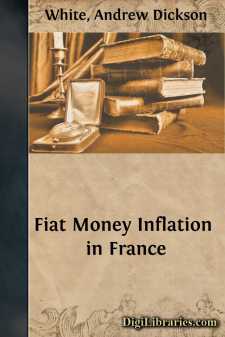Categories
- Antiques & Collectibles 13
- Architecture 36
- Art 48
- Bibles 22
- Biography & Autobiography 813
- Body, Mind & Spirit 142
- Business & Economics 28
- Children's Books 13
- Children's Fiction 10
- Computers 4
- Cooking 94
- Crafts & Hobbies 4
- Drama 346
- Education 46
- Family & Relationships 57
- Fiction 11828
- Games 19
- Gardening 17
- Health & Fitness 34
- History 1377
- House & Home 1
- Humor 147
- Juvenile Fiction 1873
- Juvenile Nonfiction 202
- Language Arts & Disciplines 88
- Law 16
- Literary Collections 686
- Literary Criticism 179
- Mathematics 13
- Medical 41
- Music 40
- Nature 179
- Non-Classifiable 1768
- Performing Arts 7
- Periodicals 1453
- Philosophy 64
- Photography 2
- Poetry 896
- Political Science 203
- Psychology 42
- Reference 154
- Religion 513
- Science 126
- Self-Help 84
- Social Science 81
- Sports & Recreation 34
- Study Aids 3
- Technology & Engineering 59
- Transportation 23
- Travel 463
- True Crime 29
Andrew Dickson White
Andrew Dickson White (1832–1918) was an American historian, educator, and diplomat best known for co-founding Cornell University in 1865 with Ezra Cornell. He served as Cornell's first president and advocated for the university's non-sectarian and coeducational principles. White is also noted for his book "A History of the Warfare of Science with Theology in Christendom," which explores the conflict between science and religion. Throughout his career, he held diplomatic roles, including serving as U.S. Ambassador to Germany and Russia.
Author's Books:
Sort by:
My book is ready for the printer, and as I begin this preface my eye lights upon the crowd of Russian peasants at work on the Neva under my windows. With pick and shovel they are letting the rays of the April sun into the great ice barrier which binds together the modern quays and the old granite fortress where lie the bones of the Romanoff Czars. This barrier is already weakened; it is widely decayed,...
more...
INTRODUCTION As far back as just before our Civil War I made, in France and elsewhere, a large collection of documents which had appeared during the French Revolution, including newspapers, reports, speeches, pamphlets, illustrative material of every sort, and, especially, specimens of nearly all the Revolutionary issues of paper money,—from notes of ten thousand livres to those of one sou. Upon this...
more...



